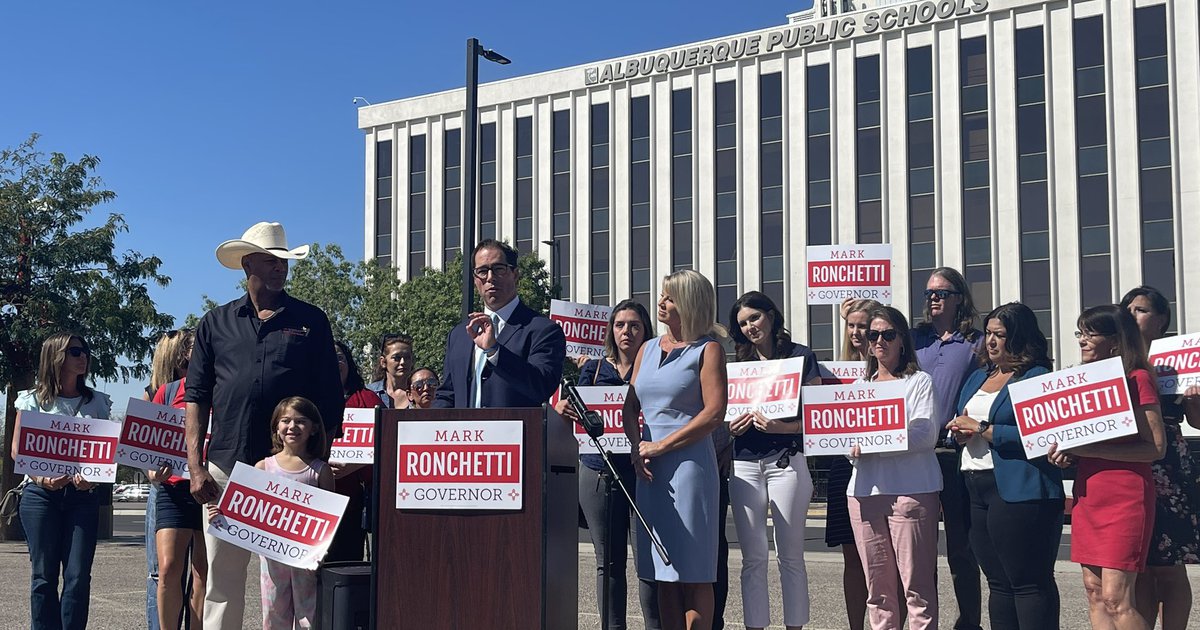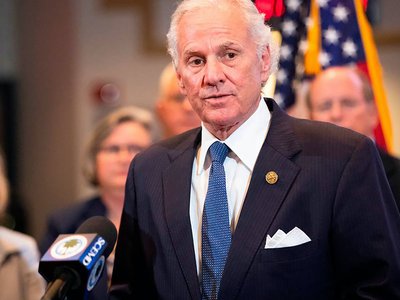Republican gubernatorial candidate Mark Ronchetti on Tuesday announced an education plan he said would help kids catch up after learning losses tied to the coronavirus pandemic — including a $100 million initiative to help struggling students in grades 1-3 with reading and math.
The effort, part of an eight-point plan, would provide $1,500 annually per student for up to 60,000 kids to receive outside tutoring for three years.
During a news conference in a parking lot across the street from Albuquerque Public Schools’ administration building, Ronchetti noted data recently released by the New Mexico Public Education Department that showed only 34 percent of public school students in grades 3-8 earned scores in the range of proficiency on statewide reading tests in the spring, and just 26 percent were proficient in math.
New Mexico generally is listed at or near the bottom of most national rankings of state education systems. Last year Forbes magazine ranked New Mexico 51st in education, behind all other states and the District of Columbia.
Ronchetti accused Gov. Michelle Lujan Grisham, his Democratic rival in the governor’s race, and other state leaders of failing public school students “consistently.”
“Where was the plan to catch them up?” Ronchetti asked.
Among Ronchetti’s other proposals is a plan that would pay high-performing principals at least $100,000 and have them train assistant principals to move into full leadership roles.
That wouldn’t create a big change at Santa Fe Public Schools. Cody Dynarski, a spokesman for the district, said the average salary for principals there is $95,000.
Ronchetti said under his the plan, the state would hire retired law enforcement officers and military personnel to fill school resource officer jobs or other positions, and he aims to allow high school students who have met all their class requirements by the end of their junior year spend their senior year in a work apprenticeship program, internship or career-focused higher education program through a scholarship initiative modeled on Colorado’s Path4Ward program.
Ronchetti stopped short of saying he would implement a school grading system — which former Republican Gov. Susana Martinez did when she was in office — but said he wants to find a way to let parents and students know how well a school is performing and ensure spending practices are transparent and open to review.
Citing a 2017 Think New Mexico study that found only about 57 percent of the state’s education budget is dedicated to classroom instruction, Ronchetti said he would push for legislation limiting how much money a school district can invest in administration so more money goes to classrooms.
He also said he would use federal funds for COVID-19 recovery efforts to create teams of professionals to address a high rate of chronic absenteeism.
Shortly after Ronchetti’s news conference ended, Senate President Pro Tem Mimi Stewart, D-Albuquerque, held an event just a block away to criticize Ronchetti’s plan, one she said would put the state’s education system “at risk.”
“He’s a danger to public education as we know it,” Stewart said.
She noted Ronchetti will need the Legislature to approve most, if not all, of his education initiatives.
If he wins the November election, Ronchetti will have to work with a state Senate controlled by Democrats and a House of Representatives that likely will maintain a Democratic majority after Election Day.
Ronchetti said he would sit down and talk with each of the state’s 112 lawmakers to find a way to work with them to improve the state’s education system.
“We can’t do it if we constantly fight each other,” he said, adding he believes some Democrats agree with his policies and want to see better education outcomes in the state.
Whitney Holland, president of the American Federation of Teachers New Mexico, which endorsed Lujan Grisham earlier this year, blasted Ronchetti’s plan.
“We cannot afford to move our profession backwards with Florida style policies like reducing qualifications for educators in our schools, and micromanaging educators’ professional judgement,” she wrote in a statement.
Stewart said at her news conference the state is offering extended learning opportunities to districts to help students catch up from lapses related to the pandemic.
The pandemic was a “kick in the gut” for the public education system, she said, adding she expects better results now that students are back in classrooms.
Stewart also cited an expected decline in the teacher vacancy rate, which was over 1,000 statewide at the start of the last school year, thanks to a $10,000 increase in the base pay for teachers at each level of the state’s three-tiered licensing system.
Teachers are coming back into the profession or moving here from other states, she said.
“I don’t believe he would be able to do any of this,” she said of Ronchetti’s plan, “because it’s not good for education.”






